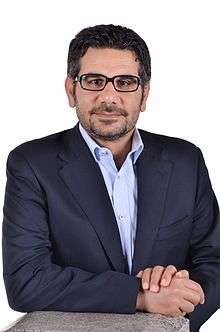Ibrahim Hamidi
Ibrahim Hamidi (Arabic: ابراهيم حميدي; also transliterated Ebrahim Humaydi) is a Syrian journalist, who heads the Damascus bureau of Arab daily newspaper Al-Hayat, and contributes to several other international media outlets and think tanks. Previously, he served as head of the Lebanese Broadcasting Corporation (LBC) office in Damascus, in addition to his work with al-Hayat, and as a senior writer for Forward Magazine in Damascus. Hamidi's work focuses on strategic issues in the Middle East, with special insight into Syria's internal and regional politics. He is also a Research Fellow and co-founder of the Syrian Studies Center at the University of St Andrews in Scotland.[1] Hamidi is also a co-founder of the Arab Investigative Journalism Program (ARIJ).[2]
Ibrahim Hamidi ابراهيم حميدي | |
|---|---|
 | |
| Born | 1969 Idlib Governorate, Syria |
| Occupation | Journalist |
| Nationality | Syrian |
| Subject | Syria and the Middle East |
Hamidi was married to writer and novelist Dima Wannous.
Early life
Hamidi was born in 1969 in Idlib Governorate. His father worked as a truck driver and died in a car accident when Hamidi was three years old and he grew up in poverty. In 1986, Hamidi was able to move to Damascus to study journalism at Damascus University through a government stipend. His English professor at the time, Abdullah Dardari, was also a correspondent for the London-based Arab daily al-Hayat. Dardari, who later became Deputy Prime Minister of Syria in 2005, helped Hamidi find work as a secretary at his al-Hayat bureau in Damascus.[3]
Career
Hamidi replaced Dardari as al-Hayat correspondent when the latter left to work for the United Nations Development Programme (UNDP). His 1996 coverage of the Arab League Summit in Cairo and the US presidential election, was highly acclaimed and helped bring him to a prominent place between Syrian journalists. Hamidi also delved into the Kurdish issue, interviewing Abdullah Öcalan, leader of the Kurdistan Workers' Party (PKK). Syrian authorities responded by suspending his journalism credentials but he continued to meet and interview Kurdish politicians, most of whom, like Jalal Talbani and Massoud Barzani, rose to power in Iraq after downfall of Saddam Hussein in 2003.[4] Hamidi also conducted interviews with high-profile Palestinian leaders including Fathi Shaqaqi, head of the Islamic Jihad Movement in Palestine who was assassinated in Malta days after his interview with al-Hayat, his successor Ramadan Shalah, and Khaled Mashal, head of the political bureau of Hamas.[5][6] As an independent correspondent his credentials have been suspended by the Syrian government several times.
Hamidi's coverage of the Syrian-Israeli peace talks in Shepherdstown aroused significant controversy. His outline of “the working document”, appeared dangerously similar to the actual agreement. The Israeli press immediately pursued the story, saying that Hamidi had leaked the information on orders from the Syrians. The Syrian team, on the other hand, accused him of leaking it through information obtained from the Americans. The talks, code-named “Mushroom Diplomacy,” were supposed to be strictly confidential and allowed to grow—similar to mushrooms—in darkness.
Hamidi went on to cover the death of Syrian President Hafez al-Assad and the subsequent inauguration of his son Bashar al-Assad as president. His coverage of the following period, known as the Damascus Spring, and his interviews with Syrian opposition figures earned him the reprimand of the Syrian government and his journalist credentials were suspended several times.[7] In 2002 he reported on Syria's preparations for the Iraq War. The government accused him of spreading "false information" and he was arrested on 23 December 2002. He remained in solitary confinement until 25 May 2003 and was later acquitted in court in 2005.[8][9]
References
- United Kingdom. "Hamidi | School of International Relations | University of St Andrews". St-andrews.ac.uk. Archived from the original on 2010-03-04. Retrieved 2013-01-07.
- http://ipj.lau.edu.lb/outreach/2005/04_arij/amman.php
- "Hamidi, Ibrahim (1969–) - PERSONAL HISTORY, INFLUENCES AND CONTRIBUTIONS, BIOGRAPHICAL HIGHLIGHTS, PERSONAL CHRONOLOGY:, THE WORLD'S PERSPECTIVE, LEGACY - President, Damascus, Syrian, and Syria - JRank Articles". Encyclopedia.jrank.org. Archived from the original on 2012-12-26. Retrieved 2013-01-07.
- "طالباني لـ"الحياة": سأطلب من بوش فتح حوار مباشر مع دمشق حول العراق وغيره". Ankawa.com. Retrieved 2013-01-07.
- "مشعل يحذّر من محاولة انقلاب "فتحاوية"". Jammoul.net. Archived from the original on 2013-02-22. Retrieved 2013-01-07.
- "Levant News - Daily News & Views from Syria". Thisissyria.net. Archived from the original on 2013-02-22. Retrieved 2013-01-07.
- "Ibrahim Hamidi: 3 reasons to let him go". Mafhoum.com. 2003-01-14. Retrieved 2013-01-07.
- "Bureau chief of pan-Arab daily arrested". IFEX. Retrieved 2013-01-07.